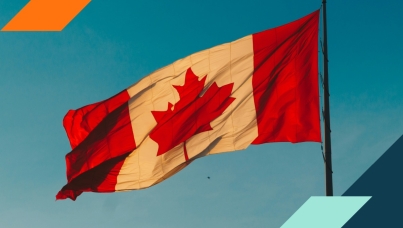Liberals (37%) Pull Well Ahead of Conservatives (31%), NDP (24%) as
Marathon Campaign Enters Home Stretch
If the election were held tomorrow, the Liberals under Justin Trudeau would receive 37% of the decided vote, up 5 points since last week. The stalled Tories would receive 31% of the vote (down 2 points), while Thomas Mulcair and the NDP continue their downward trajectory and would receive 24% of the vote (down 2 points). Gilles Duceppe and the Bloc would receive 5% of the vote nationally (unchanged) or 20% in Quebec (down 3 points), while Elizabeth May and the Green Party would receive just 2% of the vote nationally (down 1 point). One in ten voters say they either are undecided (9%) or would not vote/spoil their ballot (4%).
The recent rally of the Liberal Party is largely a function of their present good fortune in Ontario:
- In Ontario the Liberals (43%) are significantly ahead of the Conservatives (30%), NDP (23%) and Green Party (4%).
- In the "905" region surrounding Toronto, the Liberals (48%) have the lead over the Conservatives (36%), NDP (14%) and Green Party (2%).
- In the "416", Toronto proper, the Liberals (48%) have a sizeable advantage over the Conservatives (27%) NDP (18%) and Green Party (6%).
As for the rest of the country, the other provincial/regional vote tallies still put many seats up for grabs:
- In Quebec, the Liberals (29%) Conservatives (26%), NDP (24%) and Bloc (20%) are in a four-way race.
- In BC, the Liberals (37%) are ahead of the NDP (30%) and Tories (29%) who are vying for second position, well ahead of the Green Party (3%).
- In Alberta, the Conservatives (50%) have a sizeable lead over the Liberals (30%), NDP (19%) and Green Party (1%).
- In Saskatchewan and Manitoba, the Tories (39%) have a slim lead over the Grits (36%), NDP (23%) and Green Party (2%).
- In Atlantic Canada, the Liberals (50%) are well ahead of the NDP (26%), Conservatives (22%) and Green Party (2%).
The data show that Conservative voters are most likely to say that they are `absolutely certain' (61%) of their vote choice, while NDP (54%) and Liberal (50%) voters are less so. Nationally, 56% of voters say they're absolutely certain of their vote choice, while 36% are fairly certain, 7% not very certain and 2% not at all certain, suggesting that there is still some opportunity for votes to move among the major parties:
- Among Conservative voters, the Liberals (29%) are ahead of the NDP (19%) as their preferred second choice, followed by "some other party" (16%) or the Bloc (1%). Four in ten (36%) don't know.
- Among Liberal voters, the NDP (47%) is well ahead as their second choice, followed distantly by the Conservatives (17%), "some other party" (14%), or the Bloc (2%). Two in ten (20%) don't know.
- Among NDP voters, the Liberals (48%) are the dominant second choice, followed by "some other party" (17%), the Tories (9%), and the Bloc (9%). Two in ten (17%) don't know which party would be their second choice.
Trudeau Pulls Well Ahead of Harper for Choice as Best Prime Minister...
Mirroring the rise in voter support for the Liberals, Justin Trudeau is building his stature as the leader Canadians believe would make the best Prime Minister of Canada. Four in ten (38%, +5 points) believe Justin Trudeau would make the best Prime Minister, compared to 32% (down 2 points) who believe Stephen Harper is best for the job, or 30% (down 3 points) who believe Thomas Mulcair is best-suited to be Prime Minister.
Performance Factors at Play, Desire For Change Strengthens...
The irony of this election is that approval ratings for the government are relatively strong, despite lower vote support. Four in ten (43%) `approve' (12% strongly/30% somewhat) of the performance of the Conservative government under the leadership of Stephen Harper (unchanged), and if everyone who approved of the government's performance voted for it, the Tories would cruise to victory. A majority (57%) `disapproves' (34% strongly/23% somewhat) of its performance. But the desire for change appears to be stronger: most (68%) believe that it's `time for another federal party to take over' (up 1 point), compared to 32% who believe that the `Harper government has done a good job and deserves re-election' (down 1 point).
When it comes to the federal government's overall management of the Canadian economy, half (49%) of Canadians `approve' (13% strongly/36% somewhat) of its performance (down 1 point), while the other half (51%) `disapprove' (20% strongly/30% somewhat), up 1 point. In fact, two-thirds (64%) think the recently-negotiated Trans-Pacific Partnership (TPP) trade deal is a `good deal' for Canada, while 36% believe it's a `bad deal'. Interestingly, a majority of Tory (90%), Liberal (58%) and Bloc (51%) voters believe it's a good deal, while only 47% of NDP supporters believe it's a good deal, based on what they've seen, read or heard so far.
However, despite half the public giving kudos to the Conservatives for this traditional Tory strength, four in ten (40%, up 5 points) believe that Justin Trudeau and the Liberals are best able to deal with the issue of the weak performance of Canada's economy if elected on Election Day, well ahead of the Conservatives and Stephen Harper (32%, down 3 points), and Thomas Mulcair and the NDP (28%, down 2 points).
Interested in sharing your opinion? Visit the IMHOIpsos Forum today and have your say about our latest polling results.
These are some of the findings of an Ipsos poll conducted between October 9 and 13, 2015 on behalf of Global News. For this survey, a sample of 1,349 Canadians eligible to vote was interviewed online via the Ipsos I-Say Panel (comprising ~150,000 panelists) and non-panel sources (river sampling). Given Ipsos' use of river sampling and a router to match respondents who may not qualify for other surveys with one they do qualify for (such as this poll), it is not possible to identify the number of respondents invited to participate in the survey, or a traditional measure of response rate. Weighting by region, age, gender and political variables was employed to balance demographics to ensure that the sample's composition reflects that of the adult population according to Census data and to provide results intended to approximate the sample universe. The precision of Ipsos online polls is measured using a credibility interval. In this case, the poll is accurate to within +/ - 3.0 percentage points, 19 times out of 20, had all eligible voters been polled. The credibility interval will be wider among subsets of the population. All sample surveys and polls may be subject to other sources of error, including, but not limited to coverage error, and measurement error.
For more information on this news release, please contact:
John Wright, CAPOR
Senior Vice President
Ipsos Public Affairs
(416) 324-2002
[email protected]
About Ipsos in Canada
Ipsos is Canada's market intelligence leader, the country's leading provider of public opinion research, and research partner for loyalty and forecasting and modelling insights. With operations in eight cities, Ipsos employs more than 600 research professionals and support staff in Canada. The company has the biggest network of telephone call centres in the country, as well as the largest pre-recruited household and online panels. Ipsos' marketing research and public affairs practices offer the premier suite of research vehicles in Canada, all of which provide clients with actionable and relevant information. Staffed with seasoned research consultants with extensive industry-specific backgrounds, Ipsos offers syndicated information or custom solutions across key sectors of the Canadian economy, including consumer packaged goods, financial services, automotive, retail, and technology & telecommunications. Ipsos is an Ipsos company, a leading global survey-based market research group.
To learn more, please visit www.ipsos.ca.
About Ipsos
Ipsos is an independent market research company controlled and managed by research professionals. Founded in France in 1975, Ipsos has grown into a worldwide research group with a strong presence in all key markets. Ipsos ranks third in the global research industry.
With offices in 86 countries, Ipsos delivers insightful expertise across six research specializations: advertising, customer loyalty, marketing, media, public affairs research, and survey management.
Ipsos researchers assess market potential and interpret market trends. They develop and build brands. They help clients build long-term relationships with their customers. They test advertising and study audience responses to various media and they measure public opinion around the globe.
Ipsos has been listed on the Paris Stock Exchange since 1999 and generated global revenues of e1,669.5 ($2,218.4 million) in 2014.
Visit www.ipsos.com to learn more about Ipsos' offerings and capabilities.




